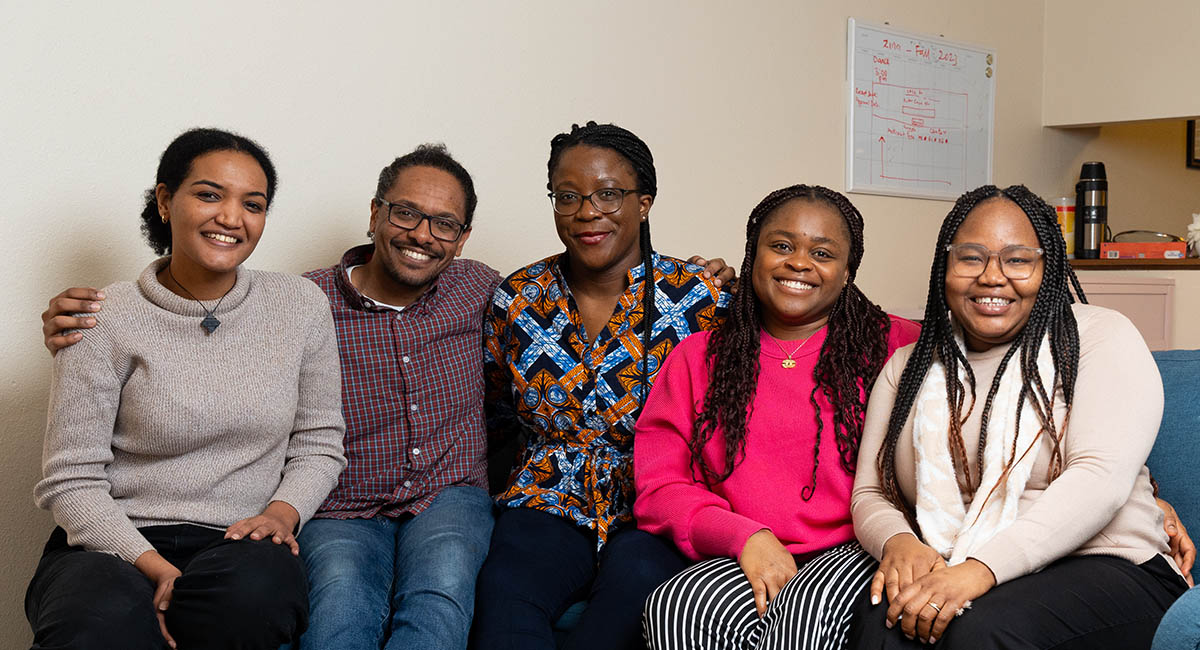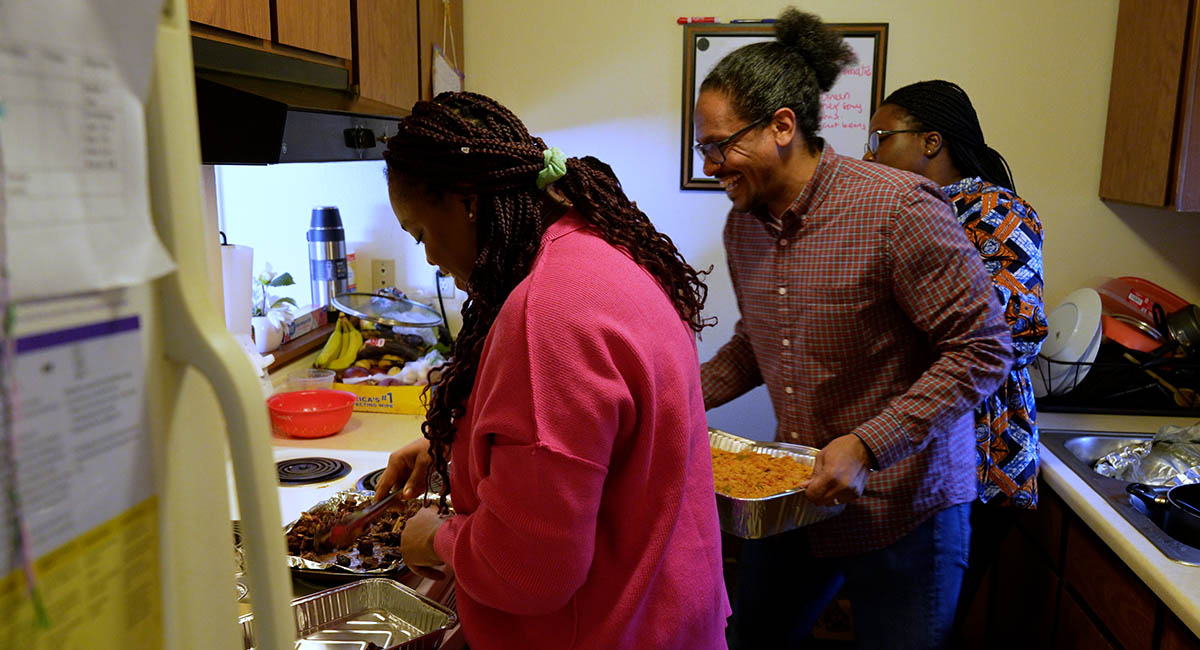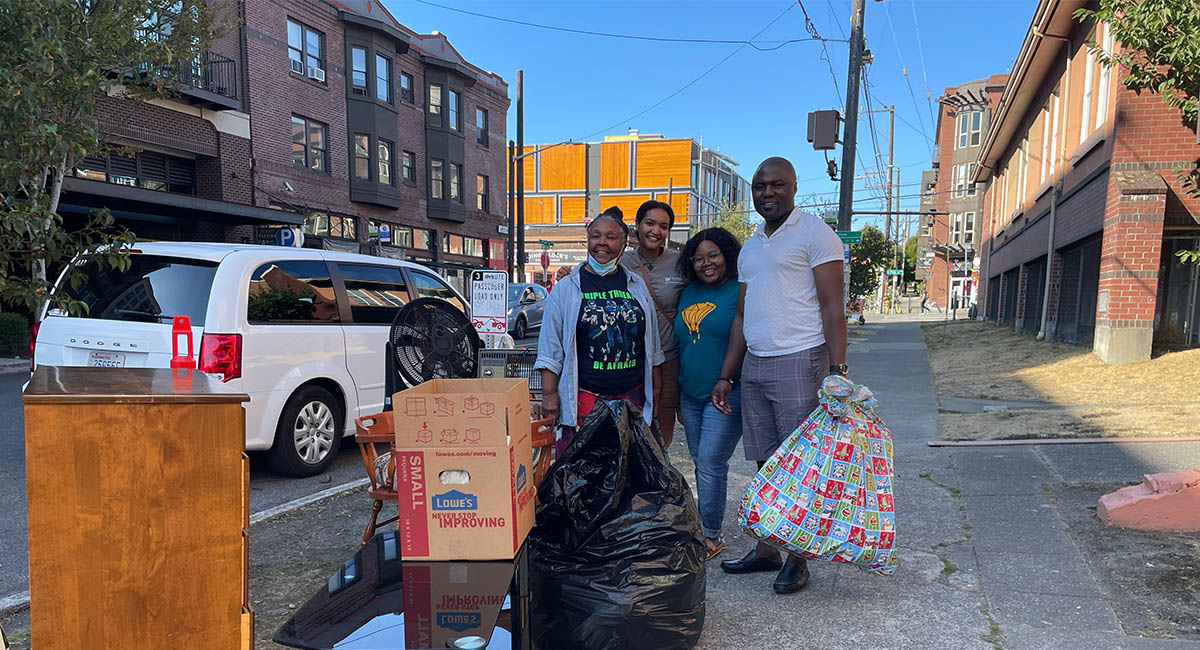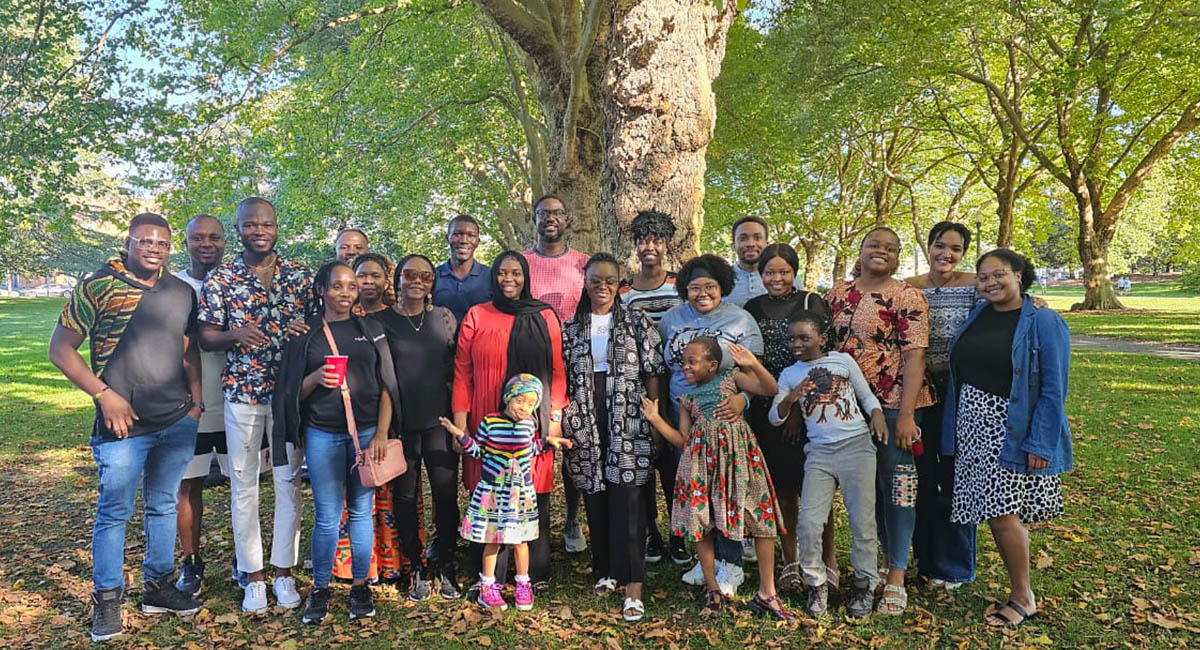
(From left) Public health graduate students Hiwot Zewdie, Mohamed Albirair, Alison Wiyeh, Jacinta Ifunanya Azie & Patience Jaman created the International Student Success Program to support their peers. Photo by Elizar Mercado
In September 2023, a group of public health graduate students drove to the Seattle-Tacoma International Airport. They were picking up a new graduate student, her husband, and their one-year-old child. Cynthia Aluoch, the student, had just traveled from her home in Kisumu County, Kenya, to begin a master’s of public health degree at the University of Washington School of Public Health (UW SPH).
Weaving between the triple-parked cars in the arrivals area, they found their new classmate and took her luggage, loading it into the waiting car. Then they headed to Aluoch’s new apartment, which fellow international students had prepared with donated furniture, kitchen supplies and bedding.
These students are part of the International Student Success Program (ISSP), a group created and run by public health graduate students at the UW. They moved from their home countries in Africa for graduate school because they wanted to create positive change in the health of their communities. But when they arrived in Seattle, they found that a lack of support for international students was impacting their ability to succeed in school.
ISSP now fills the gaps they encountered with free airport pickups, temporary accommodations, furniture, household items, and mentorship from fellow students. The core group of students who created and run it are Jacinta Ifunanya Azie, Patience Jaman, Alison Wiyeh, Hiwot Zewdie, Mariama Bah and Mohamed Albirair. Using their background as doctors and public health practitioners, and the public health and policy practices they are learning in school, they addressed the problem through community-oriented solutions.
“When ISSP started, we were thinking that this will just be something simple and ordinary,” Azie said. “But then we realized we could combine our efforts and power to create change.”
As of 2023, ISSP is part of the School’s Student and Academic Services unit, but is still student-led. The School supports the program by providing UW cars for airport pickups, furniture storage, and a paid student position. Juanita Ricks, assistant dean for students at SPH, hopes the program will grow to reach even more international students.
“A program like ISSP is the antidote to institutional barriers in academia and public health,” Ricks said. “It’s so impressive that the students created this and that the School is able to come alongside them and support their leadership and the needs that they have identified.”
More than a program, what ISSP students have been building is home. Home can be a building, a bed, a couch, a drinking glass, a bowl. But the students say it’s also someone waiting for you outside an airport, to take your suitcase and welcome you to a new country. It’s having people you can ask questions of without feeling stupid. It’s a picnic at Green Lake Park that you show up to, and waiting for you on the table are new foods from this new place, but also foods from your hometown. They may not taste the same, but they remind you of home. You may start to think that maybe the people welcoming you into this place are worth staying for, and that your goal, to impact the health and well-being of people in your previous home, are worth creating a new home for.
Wiyeh, an epidemiology doctoral student, says there’s a philosophy that is common on African soil known as “Ubuntu.” Translating to "I am because we all are," Ubuntu reflects a communal spirit. “Where I come from, we sincerely cherish people,” Wiyeh says. “We cherish a visiting person.” Wiyeh said that the students know they can’t change the culture of the U.S., but they can forge a sanctuary from which they derive strength, enabling them to navigate their new world with resilience.
Home is…someone you can ask questions of
Jacinta Ifunanya Azie has been working to improve health outcomes for women and girls in Nigeria for years, but noticed that a public health program’s strength was dependent on grant funding. When the money left, everything went with it. In September, 2021, she moved to Seattle to earn a master’s of public health degree in global health so that she could learn how to keep these resources in her community.
Azie was in her first trimester of pregnancy when she moved. Waiting for her student funding to kick in, she slept on the floor of a fellow students’ apartment and had to skip meals to get by. She sought fellow international graduate students who had started their studies while pregnant but couldn’t find any, prompting her to wonder where she could find a supportive community with shared experiences.
Patience Jaman was an emergency physician in Ghana treating women with severe pregnancy complications when she decided to pursue a master’s in public health degree in global health at the UW in 2021. She wanted to learn how social determinants of health influenced birth outcomes for women from underserved communities.
Without a credit score or U.S. social security number, Jaman couldn’t secure housing. Days before she moved, she found a fellow student on Facebook and asked if they would be her guarantor on an apartment lease. When she landed in Seattle, exhausted and hungry after a day of traveling, she was locked out of the apartment. In that moment, she wondered, “Why did I come to the UW? Was it really worth it?”
Jaman and Azie met and bonded over their shared challenges as international students. Azie had been working on a support manual for international students through her student job. The two realized they could create something bigger than this manual; a support group. Alison Wiyeh, Mariama Bah, Hiwot Zewdie, and Mohamed Albirair had each been providing support to international students in the UW Black public health graduate student WhatsApp group through solo efforts. ISSP was born through the fusion of their collective efforts, with strong support from members of the UW Black public health graduate student WhatsApp group.
While thousands of international students come to the UW from countries like China and India, many African countries only have one, two, or three students. This makes finding communities of people with shared experiences challenging.
 Jacinta Ifunanya Azie, Mohamed Albirair and Alison Wiyeh prepare food together before an ISSP group meeting. Photo by Elizar Mercado.
Jacinta Ifunanya Azie, Mohamed Albirair and Alison Wiyeh prepare food together before an ISSP group meeting. Photo by Elizar Mercado.
“Trying to find community and people, that has an impact on your academics and your ability to be present and remember the reason why you're at school,” said Hiwot Zewdie, ISSP board member and epidemiology doctoral student. While Zewdie isn’t an international student, her parents were immigrants from Ethiopia, and she’d heard stories of their challenges navigating higher education. Zewdie joined ISSP to use her experience to help others navigate the system.
Using their public health and public policy training, the ISSP board members conducted a needs assessment. Bah designed a survey that they sent to students in the WhatsApp group to understand what they needed as international students, which they learned was furniture, housing, airport pickups and community.
They asked Assistant Teaching Professor Rabi Yunusa and Pat Sadate-Ngatchou to be faculty mentors of the group. Yunusa remembers hearing about the program and thinking, “this is public health work.”
“We have a bunch of international students, and we want our graduate programs to be competitive and diverse. Graduate school is famously, very hard. So anything that students need to feel better and show up as their best, we should support,” Yunusa said.
The first year of ISSP, the board members would collect furniture donations from community members, students and alumni by carrying them across Seattle to the homes of new international students, sometimes clocking over 20,000 steps a day. They joked that what they lacked in arm strength they made up for in passion.
They picked up students from the airport and brought them to their temporary housing, watching as they crashed on the couch after 20 hours of travel and thousands of miles from their usual time zone. They’d also cook food for the students, who may not have eaten in a day.
After piloting the program for one year, the students approached the School of Public Health leadership about supporting ISSP, and leaders were eager to permanently incorporate it into its student services and programming.
“We are committed to our students' success so that they can ultimately become the change agents that we hope for,” Ricks said. “We need to establish, articulate and refine programs to support students and remove barriers so that they can focus on the life-changing work that they're here to pursue.”
 ISSP students collect donations alongside Seattle community member with LueRachelle Brim-Atkins, who has supported the students' work and served as a "community parent." Photo courtesy ISSP
ISSP students collect donations alongside Seattle community member with LueRachelle Brim-Atkins, who has supported the students' work and served as a "community parent." Photo courtesy ISSP
Home is…people welcoming you into a new place
In order for ISSP to succeed, the students needed support from the Seattle community to collect donations of home furnishings and money. One person in particular was instrumental in making that connection: LueRachelle Brim-Atkins.
Brim-Atkins is co-president of the Seattle-Limbe (Cameroon) Sister City Association. She has been building community across Seattle through her church, her work with the Sister City Association, and as a race and social justice consultant. She’s even housed international students from the UW when they’ve needed a place to stay.
When the ISSP team contacted Brim-Atkins, she called her church and professional communities to collect donations from people who were moving or downsizing. She also served as an advisor to the ISSP graduate students, who refer to her and the other Seattlites who have supported them as “community parents.” Some of the most important advice Brim-Atkins gave was to institutionalize ISSP at the UW, so that after the students graduated, ISSP could continue.
Brim-Atkins says the Seattle community’s support of ISSP is important because it helps international students see Seattle, in addition to the UW, as home. “We don't want international students to see Seattle as only the university because Seattle is broader than that. We want them to get Seattle experiences as well.”
Now, with the ISSP institutionalized within the School, prospective students and their families can feel safer taking a chance on international graduate school. Yunusa spoke with a newly admitted international student who was nervous about moving to a new country. Their parents had questions about their safety and education. Yunusa pointed to ISSP to show the School was prepared to support students. That student was able to work with ISSP to set up housing, arrange an airport pickup, and secure a SIM card all before arriving in the U.S.
“We are providing students the ability to settle down within the shortest possible time when they come to the U.S. and be able to start academics immediately,” Jaman said. “I'm glad we have been able to lift the burden of all the problems we went through from their shoulders. I'm really hopeful about what ISSP will achieve in the future.”
Pat Sadate-Ngatchou, who also served as a professional mentor for ISSP, is looking forward to the program expanding peer mentorship opportunities for incoming international students. Mentorship provides students with academic support, community, finding internships, applying for grants, and building professional connections.
“As a former international student, I deeply empathize with the scholars benefiting from this program,” Sadate-Ngatchou said. “I understand firsthand the significance of a robust support network and mentorship while navigating and adapting to new culture and surroundings. This program plays a crucial role in minimizing the adjustment period, thereby maximizing the chances for incoming students to hit the ground running and successfully navigate uncertainties associated with a new beginning.”
Yunusa pointed out the importance of having this program be led primarily by women from African countries, especially in building a community that students can identify with and trust:
“By and large, this is an immigrant Black women led program,” Yunusa said. “That should be encouraged in public health, because we know about intersectionality, and how that plays into how things affect people differently based on ethnicities and other identities they embody.”
 International public health graduate students and their families gather in Green Lake Park for a welcome picnic at the start of the 2023-24 academic school year. Photo courtesy ISSP.
International public health graduate students and their families gather in Green Lake Park for a welcome picnic at the start of the 2023-24 academic school year. Photo courtesy ISSP.
Home is…a picnic at Green Lake
On a sunny October Saturday, dozens of students arrived at Green Lake Park in north Seattle. ISSP was holding a welcoming gathering for international graduate students to build community. Across picnic tables were foods, many of which represented dishes from their home countries, such as puff puff, jollof rice, and fried plantains, which are popular meals across many West and Central African countries.
While ISSP has supported over 50 students with airport pickups, housing, furniture and mentorship, Wiyeh says she most often hears how gathering for meals helps students feel at home.
“It's funny, the power that African food has,” Wiyeh said. “It's not so much about the food itself, rather, it's about the warm and nostalgic memories of home that accompany the food. We all come from different lived experiences, but food somehow reminds you of home.”
When Wiyeh made her move to Seattle, she filled her suitcase with food given by her parents and aunties. “To me, that food reminded me of home, my identity as an African woman, and the people I had left behind at home, who were vouching for me, as I go ahead to succeed in the world and to bring back knowledge.”
Cynthia Aluoch, who had arrived weeks earlier with her family for her global health studies, brought her nine-month-old son to the park. He eagerly gestured at another seven month old baby nearby who was being held by their mother. Aluoch brought him closer so they could play.
“ISSP is a great program, especially when you're new to the city of Seattle,” Aluoch reflected. “The best way to support international students is linking them up to resources because knowledge is power.”
It’s not just new students who benefit from ISSP; board members have found the community provided support in the most challenging of times. Azie said after her mom died, dozens of students visited her home to bring flowers, money and pray with her.
“People could relate to having lost a parent while overseas and even having a baby. And that really helped me to go through that stage and come out of it,” Azie said. “That's what family means to me.”
As the day drew to an end, a student approached Yunusa to thank her for the food, saying, “How I find comfort will be in eating my mother's food. Seeing this food, although it doesn't taste the same, it just took me home and I felt at peace,’” Yunusa recalled. “I felt so proud of what these students are doing for each other.”
Support ISSP!
Want to support the work ISSP is doing? Fill out the support intake form or contact ISSP directly at issp@uw.edu.